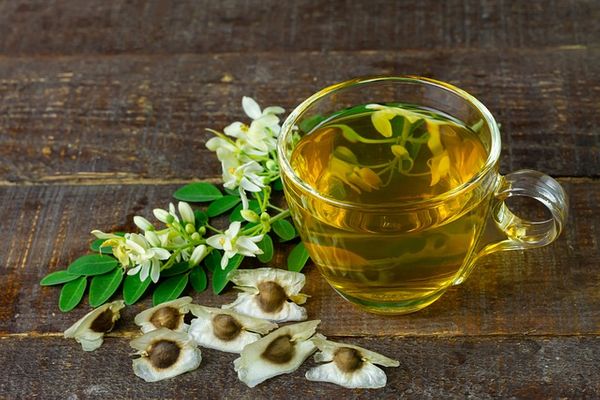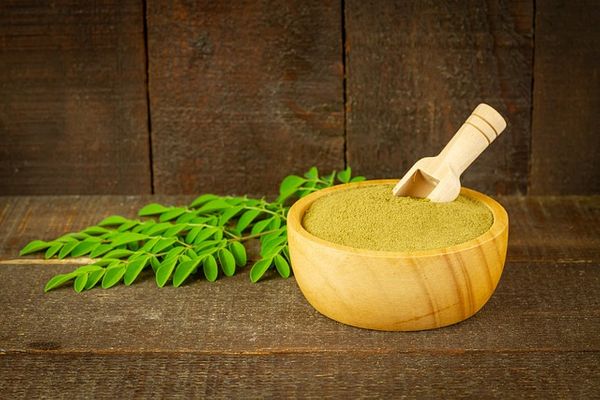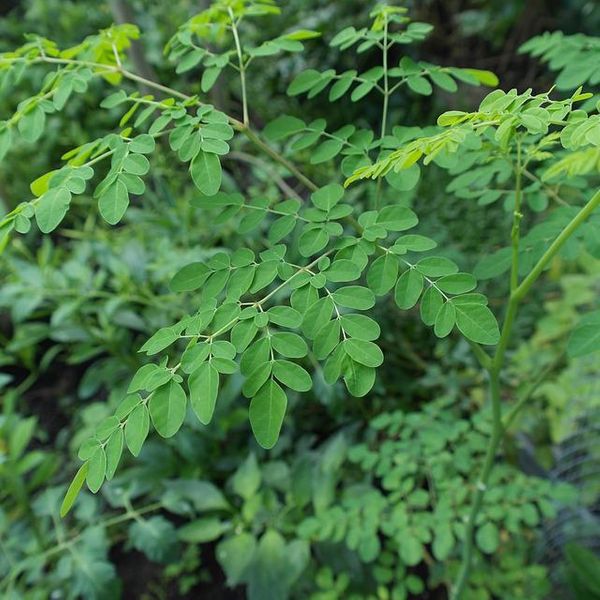The Indian plant Moringa oleifera is very rich in nutrition and has been used for years in Ayurveda as folk medicine. It is found in tropical and subtropical climates all over the world. Its common names include “drumstick tree” and “horseradish tree.” Because moringa can resist both extreme drought and light frost, it is widely grown around the world.
Because of the health benefits and medicinal uses of moringa leaves, it has been utilized for millennia. Additionally, it contains antiviral, antidepressant, anti-inflammatory, and antifungal effects. Yes, there are many health benefits of moringa, here we will tell share them all with their medicinal uses
Nutritional value of Moringa:
From its seeds, pods, and leaves (fresh, dry, and powder), Moringa is full of nutrients, vitamins and minerals. Let’s check out the nutritional value of moringa per 100g.
| Nutrients | Fresh leaves | Dry leaves | Leaf powder | Seed | Pods |
|---|---|---|---|---|---|
| Calories (cal) | 92 | 329 | 205 | – | 26 |
| Protein (g) | 6.7 | 29.4 | 27.1 | 35.97 ± 0.19 | 2.5 |
| Fat (g) | 1.7 | 5.2 | 2.3 | 38.67 ± 0.03 | 0.1 |
| Carbohydrate (g) | 12.5 | 41.2 | 38.2 | 8.67 ± 0.12 | 3.7 |
| Fibre (g) | 0.9 | 12.5 | 19.2 | 2.87 ± 0.03 | 4.8 |
| Vitamin B1 (mg) | 0.06 | 2.02 | 2.64 | 0.05 | 0.05 |
| Vitamin B2 (mg) | 0.05 | 21.3 | 20.5 | 0.06 | 0.07 |
| Vitamin B3 (mg) | 0.8 | 7.6 | 8.2 | 0.2 | 0.2 |
| Vitamin C (mg) | 220 | 15.8 | 17.3 | 4.5 ± 0.17 | 120 |
| Vitamin E (mg) | 448 | 10.8 | 113 | 751.67 ± 4.41 | – |
| Calcium (mg) | 440 | 2185 | 2003 | 45 | 30 |
| Magnesium (mg) | 42 | 448 | 368 | 635 ± 8.66 | 24 |
| Phosphorus (mg) | 70 | 252 | 204 | 75 | 110 |
| Potassium (mg) | 259 | 1236 | 1324 | – | 259 |
| Copper (mg) | 0.07 | 0.49 | 0.57 | 5.20 ± 0.15 | 3.1 |
| Iron (mg) | 0.85 | 25.6 | 28.2 | – | 5.3 |
| Sulphur (mg) | – | – | 870 | 0.05 |
(All values= 100 g per plant material) (source 1), (source 2)
Health Benefits of Moringa:
Moringa health benefits: may prevent Arsenic Toxicity
In many regions of the world, food and water are being contaminated with arsenic and that is becoming a huge problem, so much that some varieties of rice could have exceptionally high levels of arsenic levels. Unfortunately, prolonged exposure to high arsenic levels may cause health issues. Studies, for instance, have connected prolonged exposure to arsenic with a higher risk of cancer and heart disease. However, research on mice and rats has revealed that Moringa oleifera’s leaves and seeds may mitigate some of the effects of arsenic toxicity. (source )
Moringa benefits in protecting from heart diseases
Heart disease risk has been associated with high cholesterol levels. Fortunately, a variety of plant-based diets can successfully lower cholesterol. These consist of almonds, oats, and flaxseeds. Studies on both animals and people have revealed that moringa oleifera may have comparable cholesterol-lowering benefits. (source )
Also Read: Curry Leaves Health Benefits, Advantages, Nutritional Value & Side Effects
Health Benefits of Moringa: It is Anti-Inflammatory
The body’s natural response to an injury or infection is inflammation. Although it is a necessary defense mechanism, if it persists for an extended period of time, it could pose a serious health risk. In reality, persistent inflammation is connected to a variety of long-term health issues, including cancer and heart disease. Anti-inflammatory qualities are present in the majority of entire fruits, vegetables, herbs, and spices. The kinds and concentrations of anti-inflammatory substances they contain, though, determine how much of a contribution they can make and moringa is highly anti-inflammatory along with being anti-fungal, anti-viral and anti-depressant. (source )

Moringa Benefits in Skin and Hair Nourishment
Moringa seed oil helps in maintaining the health of the hair – keeping it clean while defending it against free radical damage. Additionally, because moringa contains protein, it aids in shielding skin cells from any sort of harm. Also, now that, it has detoxifying and moisturizing components that are good for the skin and hair, moringa can effectively treat skin sores and infections.
Benefits in improving blood antioxidant level
The leaves of Moringa oleifera have been found to contain a number of antioxidant plant components. These include Vitamin C, beta-carotene, and others.
Quercetin: This potent antioxidant may assist in reducing blood pressure.
Chlorogenic acid, which is abundant in coffee as well, may help control blood sugar levels after meals. In one trial it was observed that women who took 1.5 teaspoons (7 gram of moringa leaf powder ) regularly for 3 months could dramatically enhance their blood antioxidant levels. ( source 1),( source 2)
What are the Most Common Medicinal Uses of Moringa?
Moringa medicinal Uses in controlling blood sugar levels: Numerous research have demonstrated the anti-diabetic properties of moringa. It is proven to contain a lot of antioxidant properties that help in balancing blood sugar levels. According to a study, M. oleifera’s aqueous extracts can treat rats with both insulin-resistant Type 2 diabetes and Type 1 diabetes that was brought on by streptozotocin. (source )

As an anti-cancer agent: Moringa is considered natural, dependable, and safe when administered at known quantities, it can be employed as an anticancer drug. According to studies, moringa can act as an anti-nonproliferative agent, which prevents cancer cells from proliferating. Leaf extracts that are soluble or solvent-based have been successfully used as anticancer medications. Additionally, moringa is an ideal anticancer drug since its ROS production is focused specifically on cancer cells. (source )

Helps in improving memory of the brain: It is possible to employ moringa as strong neuroprotection. The antioxidants in moringa can lower reactive oxygen species, thereby defending the brain. The leaf extracts have been found to enhance cholinergic function and memory by reducing acetylcholine esterase activity. (source )

Boosts immunity: For people with AIDS, herbalists often prescribe moringa. In order to strengthen the immune system of HIV-positive people, moringa is advised to be consumed. However, additional study is required to confirm the impact of moringa on anti-retroviral medications. (source )
Precautions and side effects of Moringa:
- It is suggested that anyone thinking about utilizing moringa speak with a doctor first.
- Because moringa may have anti-fertility properties, it is not advised for women who are pregnant.
- Very few adverse effects have been documented.
- Always read the extract’s label and abide by the dosage recommendations.





